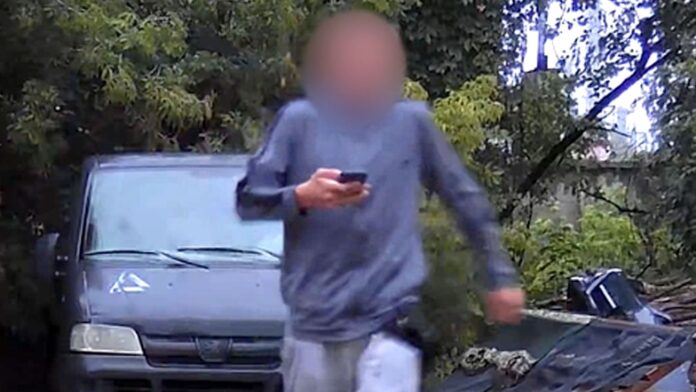He says he was promised $2,000 (£1,520) to plant the bomb in a van used by Ukraine’s military conscription service.
“When I was connecting the wires, I thought it could explode then. I thought I might die,” he told the BBC.
Vlad is one of hundreds of children and older teenagers who the Ukrainian government alleges have been recruited online by Russia, and offered payment to carry out sabotage and other attacks against their own country. His name has been changed to protect his anonymity.
He says he was told to set up the phone to live-stream the scene to his handler so they could remotely detonate the device when somebody entered the vehicle.
However, Ukraine’s SBU security service had been watching and foiled the attack. Vlad – now 18 – is awaiting trial on terrorism charges that potentially carry a 12-year prison sentence.
Sitting in Rivne’s heavily guarded detention centre with his lawyer beside him, he acknowledges that he could have helped kill somebody.
“I did think about it. But nobody likes conscription officers,” he says. “I thought: Well, I’ll be like everyone else.”
The SBU says that over the last two years more than 800 Ukrainians have been identified as having been recruited by Russia – 240 of them minors, some as young as 11.
However, cyber security expert Anastasiia Apetyk, who teaches courses about internet safety in Ukraine, is aware of even younger cases. “They tried to recruit children aged nine or 10,” she says.
Andriy Nebytov, Deputy Head of Ukraine’s National Police, says there is a deliberate strategy to seek out the vulnerable who can be manipulated.
“Children do not always fully realise the consequences of their actions,” he says.
“The enemy is not ashamed of using minors for making explosives out of household chemicals, planting them in various locations such as army recruitment offices or police stations.”
The SBU says recruitment primarily takes place on the Telegram app, but also on TikTok, and even on video game platforms. Officials says those who are recruited are almost always motivated by money rather than pro-Russian sympathies.
Vlad says he does not support Russia and had no previous involvement with crime.
He had joined two Telegram channels and posted that he was looking for remote work. Within half an hour, a man calling himself Roman replied. When they later talked on the phone, Vlad says Roman spoke Russian with a street accent.
Vlad says he was initially reluctant but was persuaded to take on a series of increasingly dangerous tasks. First, he was told to collect a grenade but when he reached the designated location it wasn’t there. He was paid $30 anyway.
A few days later came another job – to set fire to a van belonging to a conscription centre, film it and run.
For that attack, Vlad says he received about $100 in cryptocurrency – much less than the $1,500 he’d been promised. Roman told him he would get the rest if he planted the bomb in Rivne.
By James Kisoo



















